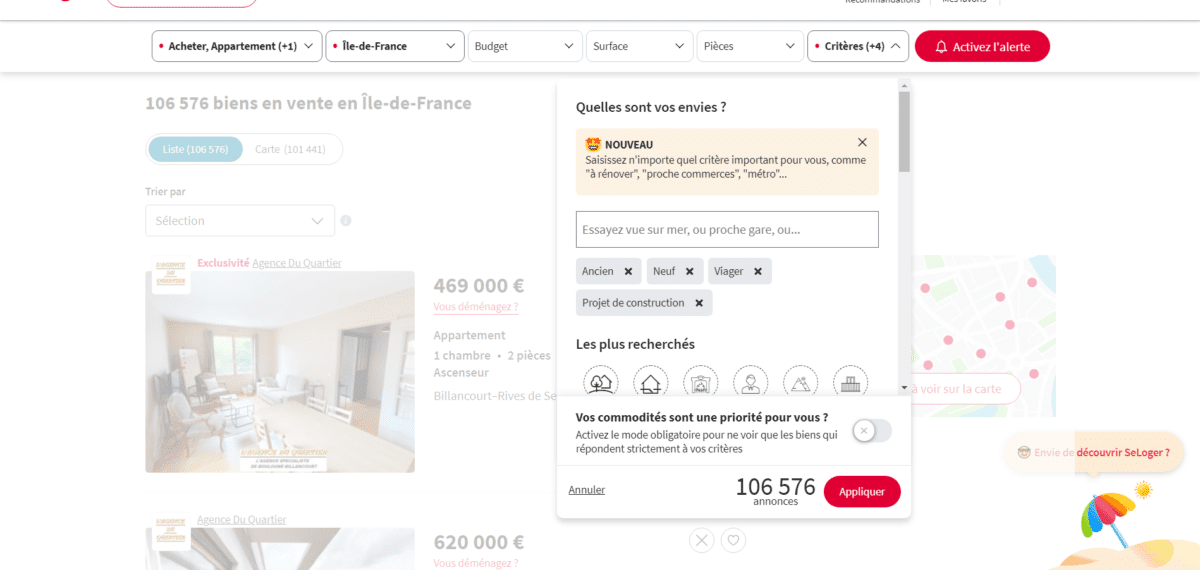
Since the start of the global Covid-19 pandemic, professionals from across the spectrum of the property market have been preaching about the importance of embracing technology. Technology is cited as key by the silver-lining brigade and the doom-mongers alike. While the clamour for technology is not necessarily misguided, there is an important nuance to the message: not all tech is created equal.
As eminent Real Estate commentator and CEO OF 1000 Watt Consulting, Brian Boero said in the latest episode of our vodcast series, “there’s no shortage of tools for an agent who wants to use that stuff.” and the same goes for portals and the tech they use to entice and engage property hunters. In this article, we take a look at a curious piece of technology which first showed up on property portals a decade ago, but has not had the revolutionary impact that perhaps its inventors were hoping for.
History
Keyword search on property portals is certainly nothing new. This article from Zoopla’s blog way back in 2010 enthuses about the portal’s new tool
However, previously for sale and to rent searches on Zoopla have predominantly been sorted by location, price, type and number of beds…until now.
Across the pond, a Zillow blogger announced in 2011, in a slightly more sober tone, that they too had a keyword search feature. The vertical search sites had been doing free text search for property for years by this point, so the new tools on Zillow and Zoopla hardly constituted a paradigm shift in the world of house hunting. In a market which regularly generates bombastic headlines about portal ‘wars’ between Zoopla and its competitors, it is perhaps indicative that arch-rival Rightmove did not come out with its own keyword feature until 2018.
The Haves and the Have-Nots
On researching this article we found that keyword search tools on big-name property portals are far from ubiquitous. Argentinan #1 Zonaprop, UK challenger OnTheMarket.com and the big South African portals Property24 and PrivateProperty are among some that we were surprised to see without the feature.
Those that do let users search their listings by keyword tend to hide the functionality pretty well. Domain.co.au is a quintessential example of a portal’s keyword feature, being as it is, housed under the “filters” section and then at the bottom of a pop-up menu. French market leader Seloger’s keyword search option is only promoted as it is new on the site and the user is encouraged to enter specific terms with pictorial hints and as-you-type suggestions. So why do the portals not want to show off their free-text search offerings?

False Positives
The answer may be that they do not trust the results delivered by their keyword search features enough to give the tool prominence. An article comparing property sites way back in 2009 refers to an early iteration of one such tool on eventual Zoopla acquisition, PrimeLocation as “erratic” and subsequently gives PrimeLocation a lowly 5/10 rating.
The inaccuracies of keyword search is something that the vertical search sites have been wrestling with for years and as the tech team at Rightmove wrote about in this excellent piece as recently as 2019. There are few worse user experiences on a property portal than that of the false positive. If a user searches for “rent aid” and sees results for only “rent aid not accepted”, they will more than likely end up as no more than a contributor to a high bounce-rate.
Advanced Users Only?
The expected user journey on portals is centred around a first filter, the location, and then the user sorts results further using filters presented to them on the landing page. There are few property features that are not covered by the array of filters on most portal landing pages. Could it be that the keyword filter is just a novelty?
There is no real data publicly available on what percentage of users use keyword tools on portals, but those that do are likely to be experts rather than first-time buyers. Certainly the buy-to-let landlord community were one group who were happy with the tool brought out by Rightmove as it let them find properties marked as “cash buyer”, “quick sale” or “BTL investor”.
The Bigger Question
Rightmove is among the few portals to make any real PR noise around its keyword tool these days. This is a bit surprising, as every time they do publish data from the tool it generates some positive headlines in the national press. We can perhaps assume then that Rightmove’s keyword search tool is among the more reliable ones out there and that the back-end is in place to use the classification of property listings for other things.
It’s one thing to use technology to enhance user experience on-site, but if a portal can flag property listings in a given location which match a search term like ‘balcony’, why would it not group this content together onto a specific URL and go after Google users searching for properties with balconies (of whom there must be many in the current circumstances)?
New Possibilities
This is something that most portals currently do not do, and something that the vertical search sites will hope stays how it is. Certainly, we can say that if the portals trust the classification of their listings they use for their keyword search tools, then there are many more possibilities available to them.